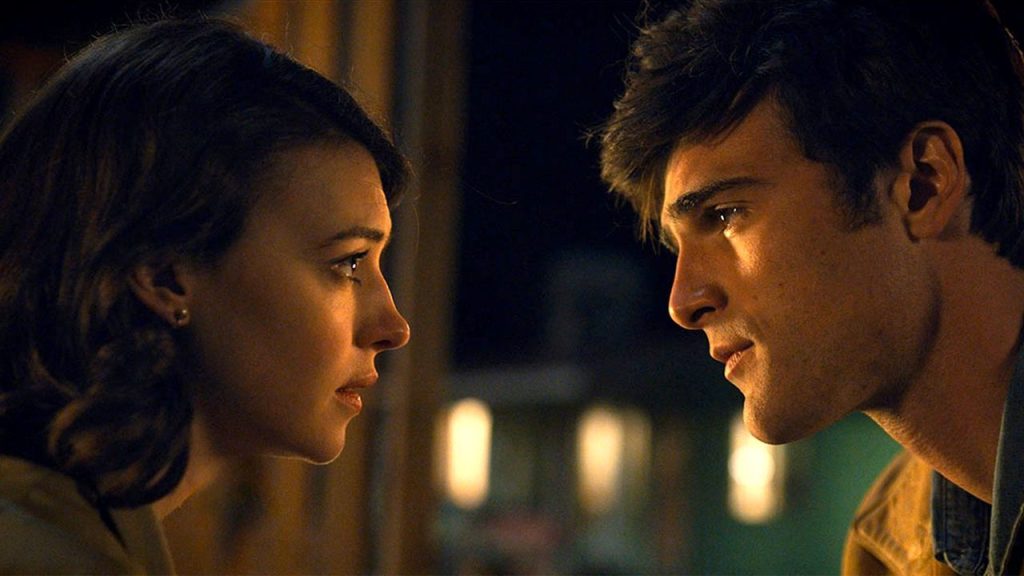“On Swift Horses” Review: Daisy Edgar-Jones and Jacob Elordi Navigate an Overstuffed 1950s Drama
3 min read

In the new film “On Swift Horses,” Daisy Edgar-Jones and Jacob Elordi lead a drama set in the repressed 1950s, exploring themes of hidden sexuality and personal freedom. Despite a promising premise and strong performances, the film’s execution falters under the weight of its ambitious plot.
At its core, “On Swift Horses” tells a story that initially appears to be a classic love triangle, or even a quadrangle, centered on the constraints of 1950s society. Daisy Edgar-Jones stars as Muriel, a woman who moves from Kansas to California with her husband Lee, played by Will Poulter. Jacob Elordi portrays Julius, Lee’s brother, who quickly forms a bond with Muriel. From the outset, it’s clear that Muriel’s marriage is more a matter of duty than desire, and there is a palpable, though non-sexual, connection between her and Julius.
Instead of focusing solely on the love triangle, the film delves into more nuanced territory. Julius’s journey takes him to Las Vegas, where he engages in a passionate affair with Henry (Diego Calva). Meanwhile, Muriel, grappling with her own dissatisfaction and burgeoning attraction to women, embarks on a path of secrecy and self-discovery. The film aims to portray the complexity of hidden lives and unspoken truths but struggles to fully capture this depth in its cinematic form.
Edgar-Jones delivers a beautifully understated performance as Muriel. Her portrayal of a woman living a double life—balancing societal expectations with her secret desires—is poignant. Yet, despite her efforts, the film often feels stagnant. The pacing is sluggish, and the narrative’s attempts to balance multiple threads result in a somewhat pedestrian experience. The film’s style is neither convincing enough to immerse viewers in its world nor stylized enough to evoke a sense of poetic reflection.
Director Daniel Minahan, known for his work on television series like “Fellow Travelers,” presents a film that is thoughtfully conceived but lacks vitality. The parallel journeys of Julius and Muriel are meant to echo each other, yet the infrequent interactions between Edgar-Jones and Elordi leave Julius’s claims of an instinctive understanding between them unconvincing.
Visually, the film occasionally shines, such as in scenes set in San Diego where Muriel, dressed in quintessential ’50s attire, frequents the racetrack and begins to unravel her secret life. Her interactions at the track, including a subtle flirtation with Sandra (Sasha Calle), are among the film’s highlights. Edgar-Jones effectively conveys the thrill and liberation Muriel experiences while maintaining her facade as a conventional wife.
Elordi, as Julius, attempts to embody the charismatic yet troubled figure of the ’50s hustler, but his performance falls flat, particularly in moments that demand intense emotional engagement. Diego Calva’s portrayal of Henry is dynamic and volatile, though it contrasts starkly with Elordi’s subdued performance. The film’s depiction of their relationship is also less explicit than anticipated, lacking the fiery intensity suggested by promotional materials.
Will Poulter stands out with a nuanced portrayal of Lee, revealing layers of complexity that add depth to his character. His portrayal of a man who, while committed to the American suburban ideal, is acutely aware of his brother’s hidden life, adds a layer of intrigue. Poulter’s Lee is both protective and perceptive, though his warnings to Muriel about Julius’s true nature come across as somewhat heavy-handed.
Bryce Kass’s screenplay, adapted from Shannon Pufahl’s 2019 novel, is overloaded with narrative elements. The interplay between gambling, the emotional entanglements, and the hidden gay lives creates a tangled web that may have been compelling if explored separately. Instead, the film becomes a cluttered amalgamation of too many plotlines, diluting the impact of each.
In his director’s statement, Minahan suggests that gambling symbolizes queer love and money represents freedom. While this concept may resonate as a thematic idea, it struggles to translate effectively onto the screen. “On Swift Horses” is not without merit, but given its talented cast and ambitious narrative, it ultimately falls short of its potential.